On a related note to my previous entry, "Surviving as setting an example", I thought some wisdom from experience as an elite athlete abroad could provoke some reflection, as it did for me, in what it is to be, or what our role should be, as athletes in society.
It's all good to go for the glory, reach your absolute potential and make the necessary sacrifices, but what if you want to - or need to - get a day job and wonder what the heck winning gold medals at the Olympics does to help ordinary people in their everyday lives.
The answer is similar to "surviving" as a professional adult with a young family - setting an example. But in this case, you do so by providing excitement to people. Going from a nobody finishing last in every race to a world-class athlete teaches you to believe in yourself. Watching someone do it can - and should - give other people that same confidence. Your crusade to excellence becomes theirs.
You can do this as an elite athlete because you are visible... especially when you are the only white guy in town and stand out whether you like it or not! This is how my athletic career took shape in Japan.
But first some background: I had lived and raced full-time in Canmore, AB with the Junior and Training Centre teams for three years. I had had a bad third year, but the "bad results" didn't bother me enough, I felt, as I loved to train, but didn't care enough about winning... hmm, not so good if one intends to put off school and do this for another ten years. For that and other reasons, including the need to be independently wealthy (nothing's changed it seems), I thought it best to "go back to school". I continued to train and race casually during my undergraduate degree, and then I met my wife-to-be. Suddenly, I had a very good reason to go to Japan after graduation...
In advance of arriving, I asked Ryoko (now my wife) if there were any races going on where she lived (and where I was lucky enough to find work). She signed me up for two local triathlons. Should be fun, I thought.
The second of the two was bit low-key compared to the first - pool swim, bike leg on bike paths and the run over the same course - and the competition wasn't very big. Pardon, it was ferocious, but I was the strongest of it all and won the race. Yeah, win a medal, some prizes, great fun...
I did not expect my picture to be in the local and prefectural (provincial) papers the next day:
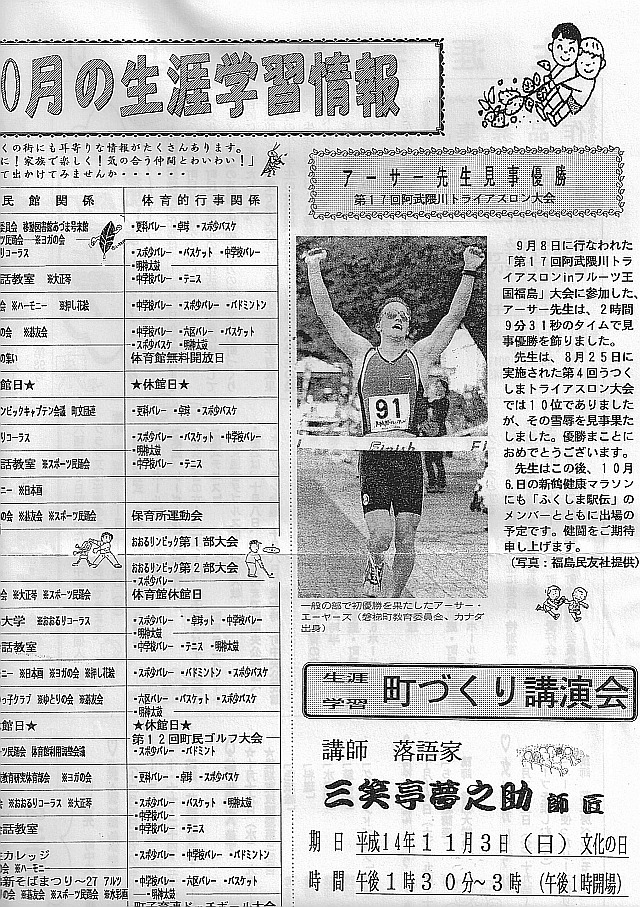
So on top of being the latest curiosity in a small town and area, I was now decidedly famous as a "spo-tsu man". Um, sure - fine by me, I thought. It wasn't hard to bask in the attention. The locals, most of whom work at the same City Hall I worked at, whose children I probably taught, would cheer me on as I went by on my bike. The local grocer would ask how my training is going and give me extra broccoli if he thought it would help me. I even got the exaggerated image from neighbouring towns. I recall one anecdote, talking with a woman and telling her I was from Bandai. She said "Oh, Bandai! There is another foreigner there who's this great, big iron-steel triathlon guy (gesturing large muscle flexes as she described this seemingly Herculean figure) who,... oh what's his name again..." "A-sa Eh-a-zu?" "Yes! Do you..., oh! Tee-hee-hee, I was expecting somebody..." ... flashback to Braveheart: "Impossible, William Wallace is 7 feet tall," "Aeh, and if he were here today, he'd obliterate the English with lightening bolts from 'is eyes and lightening bolts from 'is arse!"
Pleasantries aside, something more profound occurred to me. People actually cared that I raced, and they also cared that I do well in those races. Consistent with Japanese "group think", people associate you with where you come from - in my case, the Town of Bandai. What is Bandai known for? See below:
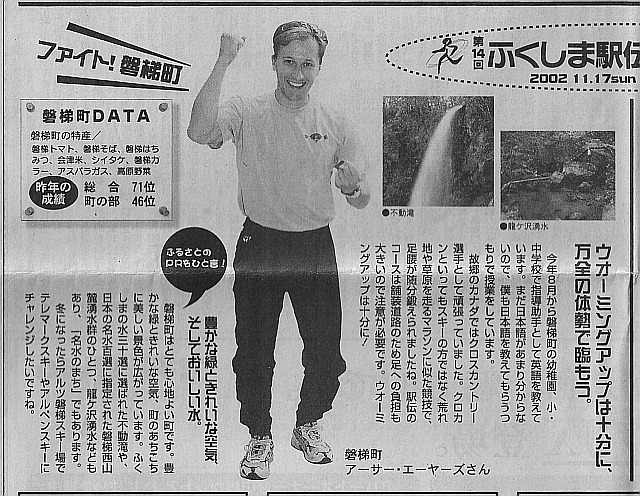
This is a promotional ad for the yearly Fukushima Ekiden marathon running relay. I would take part every year as a runner, and later also as a coach. Notice that my name is in small letters at the bottom and the text relating to me is on the right side of me. The rest is all about the Town of Bandai. The speech bubble to the left says "Fight Bandai!"Below that is a list of vegetables (count 8) and a description of the spring water and fresh mountain air the Town is famous for, with pictures to illustrate to my right.
In other words, your Town, company or school gets on the map. That came in handy when the Town wanted to promote its English program - that was my day job. The bet was that a good education program would counter rural de-population and attract young families from bigger cities (Bandai had a dwindling population of 4000). It worked. The Town hired a senior Board of Education trustee, otherwise ready to retire, to help lead the charge. It then hired a second foreign English teacher and built affordable housing units that only young families could rent, and come they did. Already known for the athletics, it was easy for me to become the face of the Town's English Program:
http://www.town.bandai.fukushima.jp/t_kyoiku/arthur.htm ... I'll forgive them for not updating their website
The result was that I played a small part in urban and educational development by being an athlete. I felt needed and respected as an athlete; indeed, people couldn't seem to think of me otherwise.
Quite a contrast from life in Canmore, which felt like an ongoing training camp (not that I don't enjoy those) with a group of friends. Townspeople outside of the sport seemed oblivious, let alone interested in the fact that a national team lived and trained in their midst.
Of course, there's more to sport than elite competition. Not all people and not all races are for the absolutely elite and North America is great, among other things, for outdoor "lifestyles" and the accompanying infrastructure and events that allow anyone to participate in and get fit.
That does not seem possible in Japan, where you either do something full on or not at all and informality is synonymous with neglect and embarrassment. There could never be a local time trial with just volunteers and a few cones to mark the course. Any event must be big, promoted and include formalities:
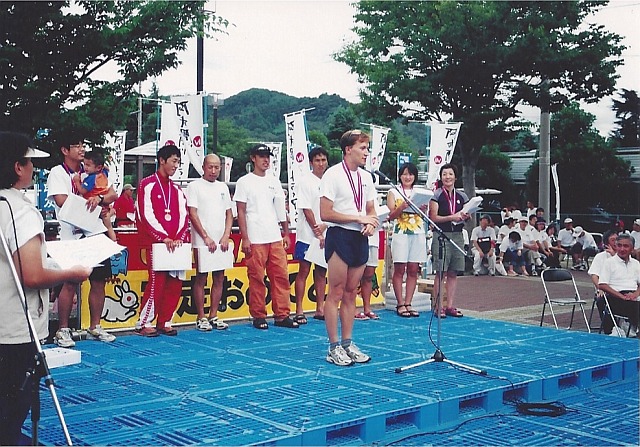
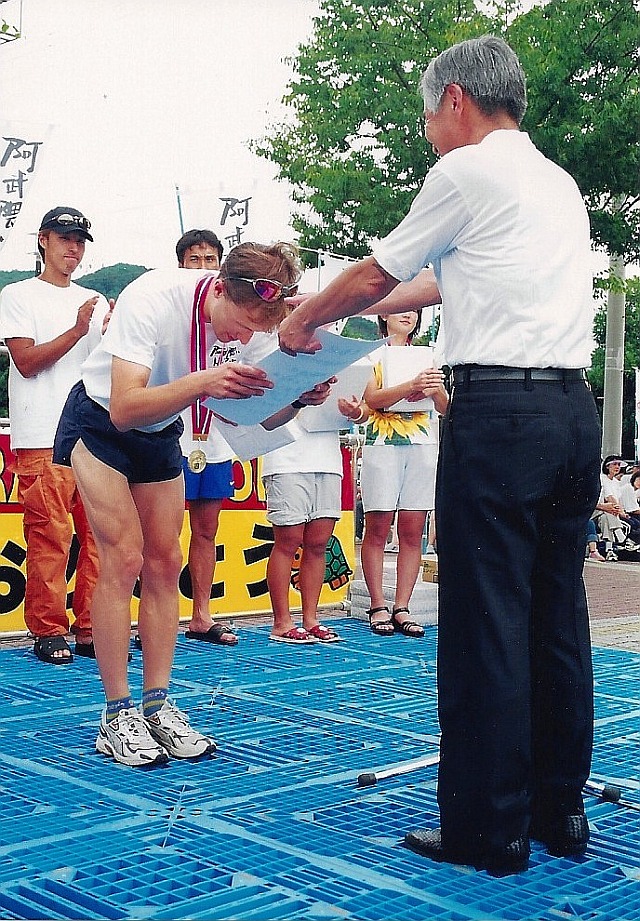
Here, I am receiving my first place certificate from Mitsuhide Iwaki, the local member of the Lower House and an amateur triathlete himself. Any race will have dignitaries giving awards, and without fail, involve an almost equally elaborate opening ceremony, conveniently 30 min before the start of the race. I've even given an oath on a number of occasions.
It made cross-country skiing difficult. No people "just skiing" = no regularly prepared ski trails. I would go to the local alpine hill and have to get special permission from the ski patrol to use their cat track either late at night or early in the morning. Races would be held on make shift course cut on a farmer's field or cow pasture, which was not level, exposed (= windblown) and only open for very short windows of a few hours on a Saturday, where hundreds of school children would be on the course at the same time. No gliding peacefully in nature's serenity here. Even in ski centres such as Nagano, the trails would only open for short periods. Elite skiers would come either from universities or the military, who would fund them very well, and they would spend most of their time in Hokkaido, the northernmost island, or Europe for training and racing.
The Japanese do find a way to get non-elite athletes involved however, and here is a shining example:
The Fukushima Ekiden is a 16 person point-to-point relay covering a total of ~95km, held every year in November, each team representing one of every city, town or village in the prefecture (total 60 teams). Some legs are reserved for junior high school students, others for high school, some are open, and six legs are reserved for women. Our team was composed mostly of junior high school students, but one of the parents would run (while battling cancer I might add) with myself and one of the coaches as the adults. It was broadcast live on TV, there was a rolling road closure, we would all get a full uniform, hotel accommodation the night before the race and transportation to on-course practices. Half of the townspeople would volunteer to support the runners. There were three practices held per week, rain or shine. And yet, at least in our case, you did not need to be an elite athlete and feel that the team had to place in the top 30. We all got together and practiced hard, went to the race and just enjoyed it. I consider it the best race out of all I have ever done - better even than World Junior Championships.
Here are a few photos of me racing it in 2005:
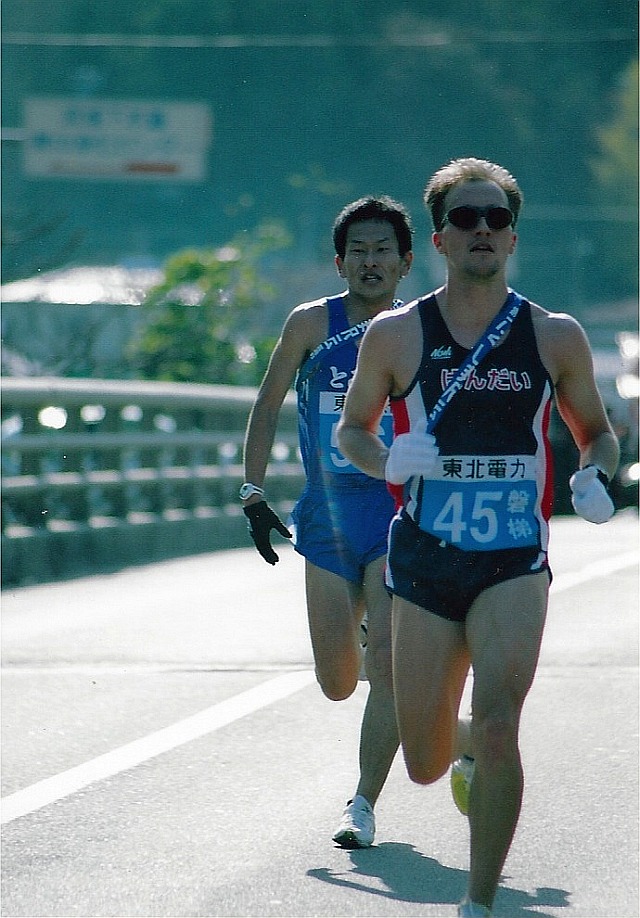
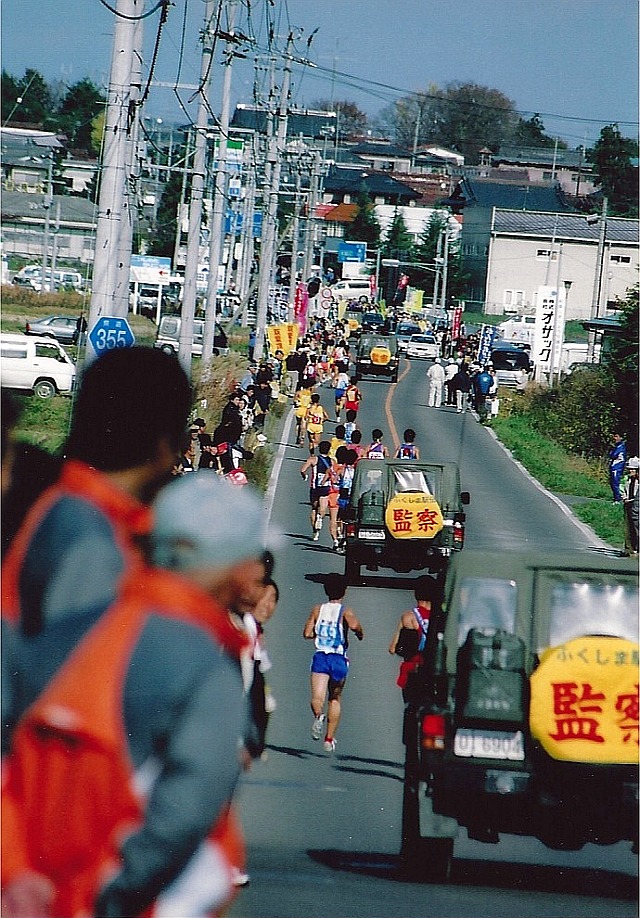
Here is my tag-off to one of my students:
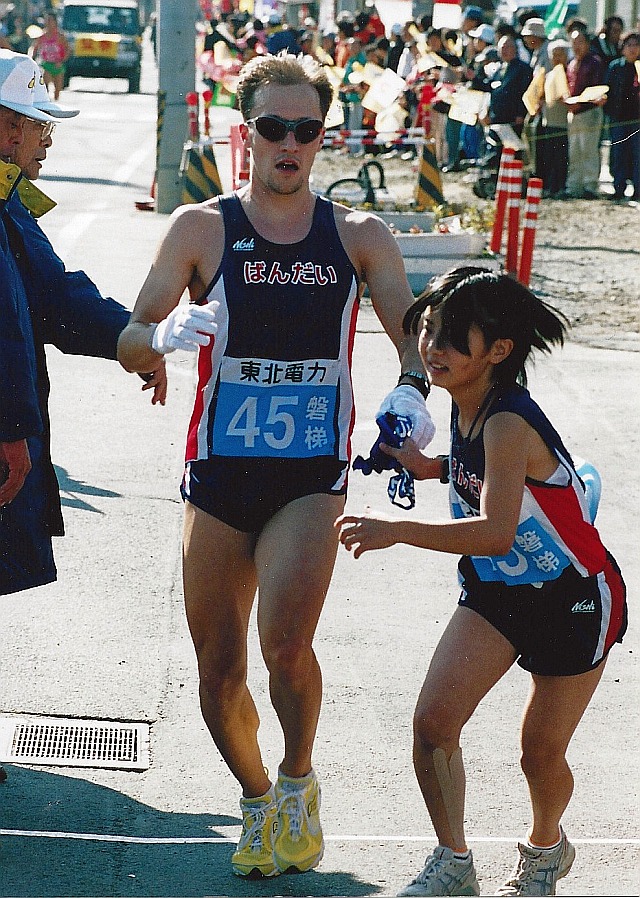
And it may be inconvenient to cross-country ski, but there is plenty of hiking:
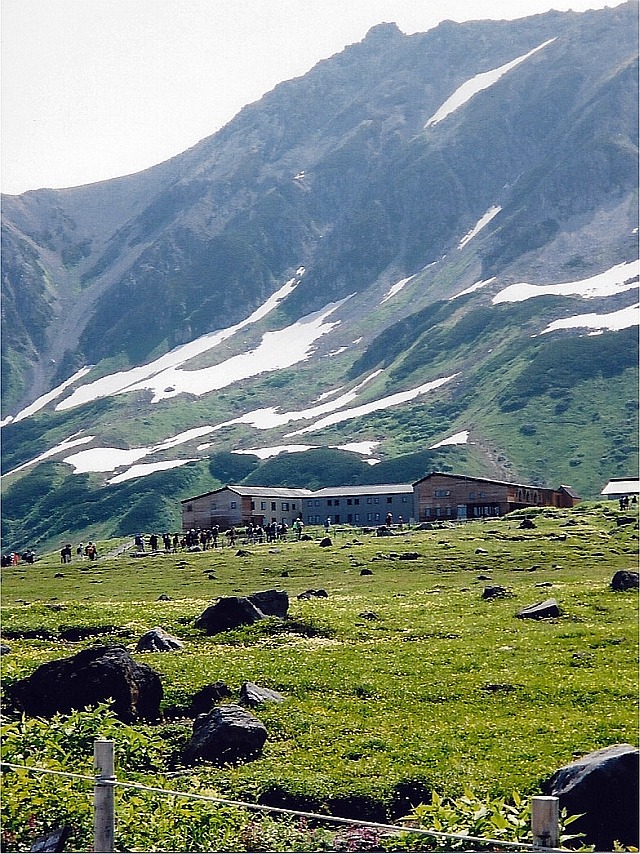
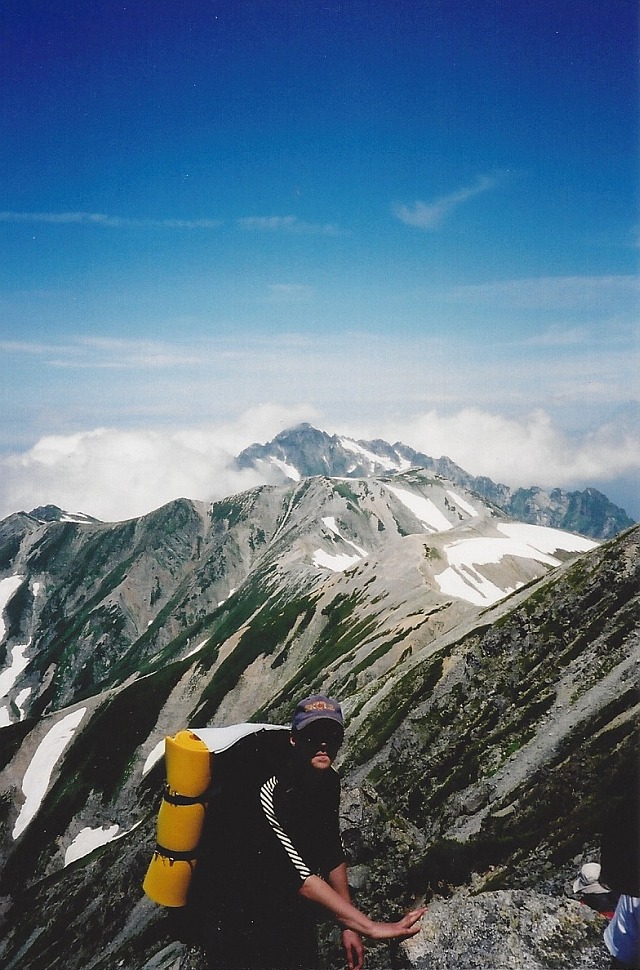
But my personal favourite, the mountain roads - ah, the mountain roads of Japan. This was the most spectacular one to me: 22km of climbing on one side, that peeks in a volcanic zone where the vegetation disappears, at an altitude of 1800m:
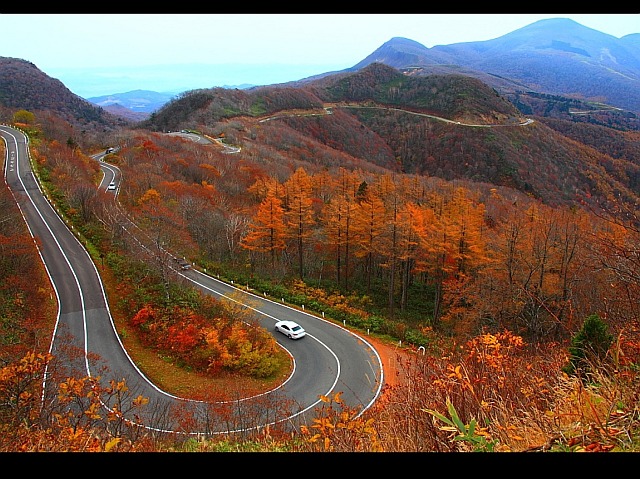
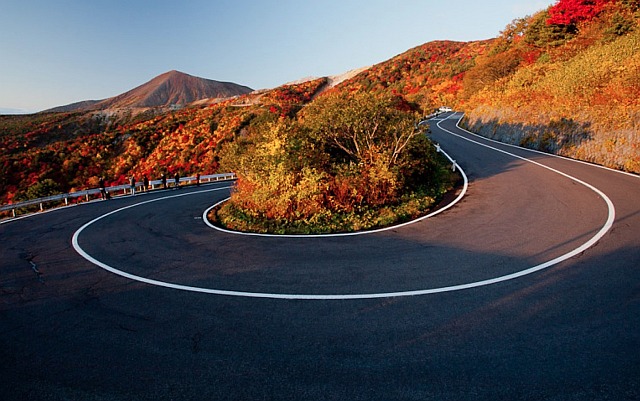
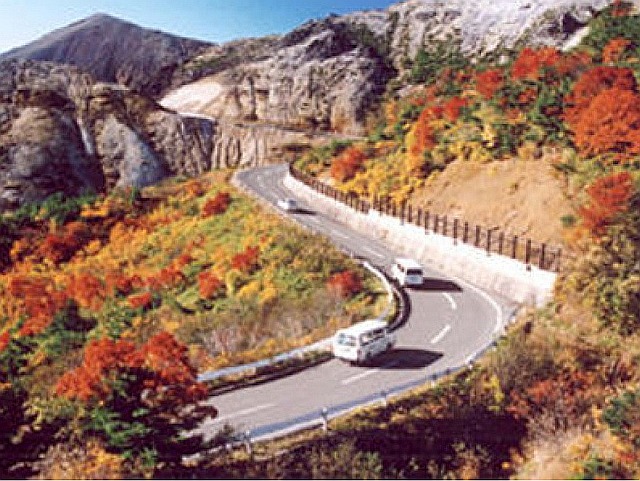
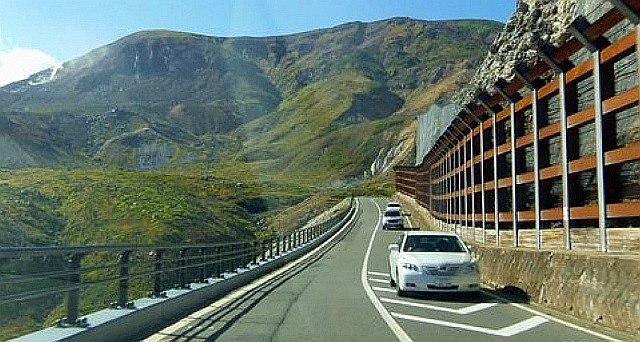
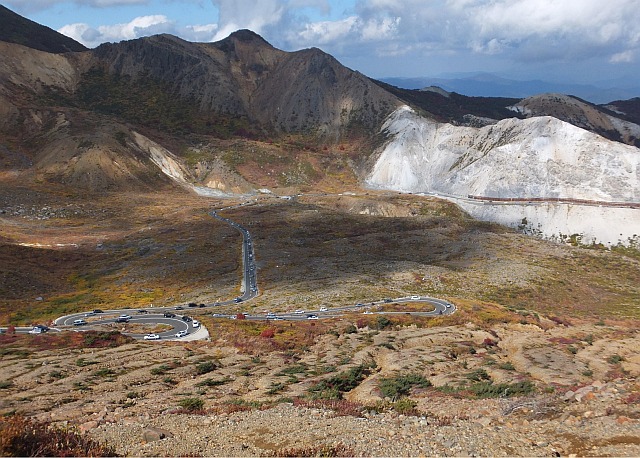
You enjoy what you have and adapt - not so hard to do with this waiting for you at the end:
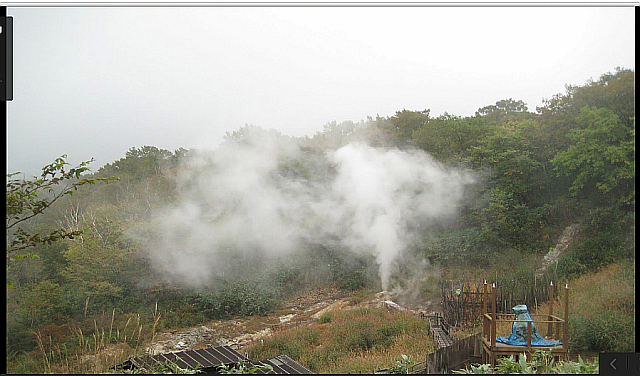
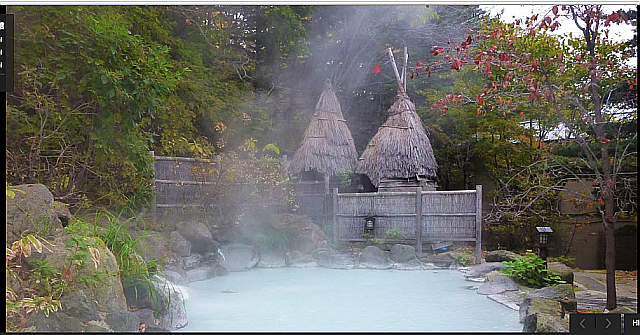
Interesting Reading. . .


